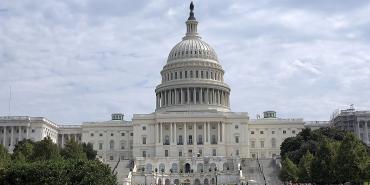More than 100 AFT members took a virtual journey to Capitol Hill on July 6 as part of the AFT’s biennial TEACH conference, queuing up Zoom meetings to urge members of Congress to fund public schools, support unions and take care of our nation so that we not only recover from the pandemic but thrive.
Before they headed out, AFT President Randi Weingarten cheered them on and introduced Rep. Jamaal Bowman (D-N.Y.), a member of the House Education and Labor Committee who underscored the importance of this work. “We need members of Congress to be champions of public education and champions for our children,” he said. “There are not enough [Congress members] who really understand what our families are going through, what our kids are going through, what our teachers are going through on a day-to-day basis.” As a former teacher and school principal, he knows that AFT members, better than anyone, can offer a real picture of what a classroom full of 35 students is like when there are not enough resources to meet their needs.
In small Zoom meetings, members met with the people responsible for creating laws and tapping funding that could make all the difference. They described the nuts and bolts of teaching in schools with insufficient air conditioning and poor ventilation, and where flooding after rain is commonplace. Others described the difficulties of teaching children who are not well prepared for kindergarten and first grade.
In a debrief afterward, Cassandra Jordan, a teacher in Philadelphia, said she told her representative about several first-graders who couldn’t read their own nameplates on their desks. “If universal pre-K were available, a lot more children would have a lot more going for themselves in the first grade and kindergarten,” she said. “It needs to happen right away.”
“We spoke about the fears people have about going back” to in-person learning, said Rosa Soto-Thomas, president of the St. Croix Federation of Teachers in the U.S. Virgin Islands. Infrastructure there has been a long-standing problem, and some children will return to sweltering buildings with no air conditioning.
“I mainly focused on having support for retaining teachers of color,” said Glazell Toledo, a teacher in Minnesota who says she nearly quit the profession because of the inequities she experienced in her school district. Education Minnesota reached out to hear her story, and she is eager for more action.
Other participants talked about the challenges of a hybrid teaching model, when teachers are trying to teach in-person and remote students at the same time. New Jersey teacher Jennifer Rogers described how she needs support to teach middle school students who come to her reading at a second-, third- or fourth-grade level.
Many of the AFT lobby day participants focused on thanking members of Congress for the American Rescue Plan Act, which has been invaluable in providing resources for safely reopening school buildings, helping ease worries over mitigation of pandemic contagion, and addressing staffing shortages and students’ social and emotional needs.
But more is needed, AFT members told their elected officials as they pushed for additional resources in the American Jobs and American Families plans proposed by President Biden, bills that are critical to building back better and spurring our recovery.
The everyday experiences that drove these meetings are proof that investments are crucial: crumbling schools and insufficient technology call for the $100 billion in grants and $30 billion in bonds for K-12 public school infrastructure the AFT is supporting in the American Jobs Plan. Hearing about students whose families benefit from programs like free and reduced-price school lunches, additional school staffing and social services brings home the need for more Title I and community schools funding.
Other issues on the table during AFT lobby day included:
- Free, universal preschool for all 3- and 4-year-olds.
- Teacher residency programs, special education teacher development and teacher preparation programs at historically Black colleges and universities, tribal colleges and universities, and other minority-serving institutions.
- A Rural Partnership Program to help rural regions, including tribal nations, by supporting locally led planning and capacity-building efforts.
- Evidence-based community violence prevention programs.
- Voting rights secured in the For the People Act and the John Lewis Voting Rights Advancement Act.
- Labor rights secured in the Protecting the Right to Organize Act.
“I think we got our message across,” said Fred Albert, president of AFT-West Virginia and an AFT vice president, who visited two representatives from his state. “We told them what we expect of our representatives. We expect them to be champions for public education.”
[Virginia Myers]

